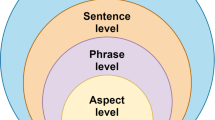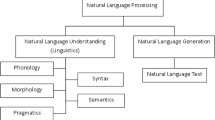Abstract
Various combination of Natural Language Processing and Machine Learning methods offer ample opportunities wherever texts are an important element of an application or a research area. Such methods discover patterns and regularities in the data, seek generalization and in effect learn new knowledge. We have employed such methods in learning from a large amount of textual data. Our application is electronic negotiations. The genre of texts found in electronic negotiations may seem limited. It is an important research question whether our methods and findings apply equally well to texts that come from face-to-face negotiations. In order to confirm such more general applicability, we have analyzed comparable collections of texts from electronic and face-to-face negotiations. We present our findings on the extent of similarity between these two related but distinct genres. In this study we have analyzed similarities in the text data of electronic and face-to-face negotiations. The results show that – in certain conditions – vocabulary richness, language complexity and text predictability are similar.
Similar content being viewed by others
References
Allen, D. E. and Guy, R. F. (1974). Conversation Analysis: The Sociology of Talk, Mouton, The Hague.
Brett, J. M. (2001). Negotiating Globally, Jossey-Bass, San Francisco.
Francis, W. N. and Kucera, H. (1979). Brown Corpus Manual, http://helmer.aksis.uib.no/icame/brown/bcm.html.
Cellich, C. and Jain, S. C. (2004). Global Business Negotiations: A Practical Guide, Thomson, South-Western.
Chen, S. F. and Goodman, J. (1996). “An Empirical Study of Smoothing Techniques for Language Modeling,” Proceedings of the 34th Annual Meeting of the Association for Computational Linguistics, 310–318.
Chu-Carroll, J. and Carberry, S. (2000). “Conflict Resolution in Collaborative Planning Dialogues,” International Journal of Human-Computer Studies 53(6), 969–1015.
Hargie, O. and Dickson, D. (2004). Skilled Interpersonal Communication: Research, Theory and Practice, Routledge.
Katz, S. M. (1987). “Estimation of Probabilities from Sparse Data for the Language Model Component of a Speech Recognizer,” IEEE Transactions on Acoustics, Speech and Signal Processing (ASSP) 35(3), 400–401.
Kersten, G. E. (2003). “The Science and Engineering of E-negotiation: An Introduction,” Proceedings of 36th Hawaii International Conference on System Sciences (HICSS – 2003), 27 p.
Kersten, G. E. and Zhang, G. (2003). “Mining Inspire Data for the Determinants of Successful Internet Negotiations,” Central European Journal of Operational Research 11(3), 297–316.
Kilgarriff, A. (2001). “Comparing Corpora,” International Journal of Corpus Linguistics 6(1), 97–133.
Oakes, M. P. (1998). Statistics for Corpus Linguistics, Edinburg University Press.
Paul, D. B. and Baker, J. M. (1992). “The Design for the Wall Street Journal-Based CSR Corpus,” Proceedings of ICSLPapos;2, 357–361.
Rojot, J. (1991). Negotiation: From Theory to Practice, Macmillan Academic and Professional.
Rosenfeld, R. (2000). “Two Decades of Statistical Language Modeling: Where Do We Go from There?” Proceedings of IEEE 88, 1270–1278.
Schoop, M. (2003). “A Language-Action Approach to Electronic Negotiations,” Proceedings of LAP 2003, 143–160.
Sebastiani, F. (2002). “Machine Learning in Automated Text Categorization,” ACM Computing Surveys, 1–47.
Sichel, H. (1986). “Word Frequency Distributions and Type-Token Characteristics,” Mathematical Scientist 11, 45–72.
Shah, M., Sokolova, M., and Szpakowicz, S. (2004). “The Role of Domain-Specific Knowledge in Classifying the Language of E-negotiations,” Proceedings of 3rd International Conference on Natural Language Processing (ICON – 2004), Allied Publishers, India, 99–108.
Sokolova, M., Nastase, V., Szpakowicz, S., and Shah, M. (2005a). “Analysis and Models of Language in Electronic Negotiations,” in M. Draminski, P. Grzegorzewski, K. Trojanowski and S. Zadrozny (Eds.) Issues in Intelligent Systems, Models and Techniques, EXIT, Warszawa, 197–211.
Sokolova, M., Nastase, V., Shah, M., and Szpakowicz, S. (2005b). “Feature Selection in Electronic Negotiation Texts,” Proceedings of Recent Advances in Natural Language Processing (RANLPapos;005), 518–524.
Ströbel, M. (2000). “Effects of Electronic Markets on Negotiation Processes,” Proceedings of ECIS 2000, 445–452.
Thomas, L., Pfister, H. P., and Peterson, P. (2004). “Issues Related to the Construction of a Purpose-Built Domain-Specific Word Corpus,” Australian Journal of Educational and Developmental Psychology 4, 13–28.
Thompson, L. and Nadler, J. (2002). “Negotiating Via Information Technology: Theory and Application,” Journal of Social Issues 58(1), 109–124.
Tweedie, F. J. and Baayen, R. H. (1998). “How Variable May a Constant be? Measures of Lexical Richness in Perspective,” Computers and the Humanities 32, 323–352.
Author information
Authors and Affiliations
Corresponding author
Additional information
This is an expanded version of a paper published in the Proceedings of FINEXIN 2005 (Workshop on the Analysis of Formal and Informal Information Exchange during Negotiations), 31–42, Ottawa, Canada, May 2005.
Rights and permissions
About this article
Cite this article
Sokolova, M., Shah, M. & Szpakowicz, S. Comparative Analysis of Text Data in Successful Face-to-Face and Electronic Negotiations. Group Decis Negot 15, 127–140 (2006). https://doi.org/10.1007/s10726-006-9024-z
Published:
Issue Date:
DOI: https://doi.org/10.1007/s10726-006-9024-z




